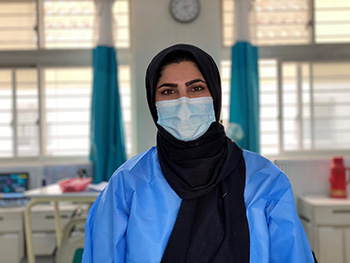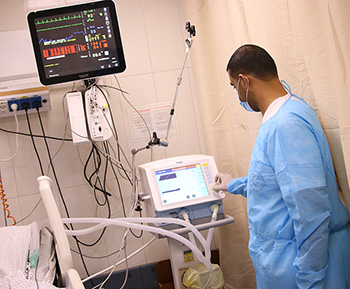24 February 2022 — Prior to the COVID-19 pandemic, most Fragile, Conflict, and Vulnerable (FCV) countries in the Eastern Mediterranean Region had little or no intensive care unit (ICU) or critical care capacity, despite their dire need to respond to patients dying from gunshot wounds, lack of trauma care, and infectious diseases, among other factors.
With the emergence of COVID-19, the populations of FCV countries became the most at risk. In addition to their minimal access to critical care, any existing facilities became overwhelmed by COVID-19 waves and many healthcare workers were immediately shifted to provide care to critical patients in COVID-19 ICUs.
Through the WHO Eastern Mediterranean Regional Office’s response to COVID-19 in the early days of the pandemic, countries of the Region began receiving medical ventilators and other biomedical equipment for the treatment of COVID-19 cases. However, avoidable deaths continued to occur and high case fatality ratios were observed in FCV countries, with COVID-19 mortality following hospital admission nearing 100% in some instances.
A multi-faceted response
WHO EMRO Medical Officer and IMST COVID-19 clinical management lead Dr. Chiori Kodama says that “When COVID-19 started, resource-limited and FCV countries had a very small number of ICU doctors and nurses. Thus, many healthcare workers were repurposed from different fields, so they didn’t know how to manage critical patients in ICUs despite their tireless efforts in saving lives. We had to start from scratch.”
Demand-led trainings were thus developed by WHO EMRO’s COVID-19 clinical management team and rolled out through on-site missions and online to frontline health workers in resource-limited and complex emergency countries as well as middle-income countries in the Region.
On the ground
 Recipient of WHO critical care/ICU training Dr Razia Ghafaari, sole woman doctor at the Afghan-Japan Hospital, the largest COVID-19 referral hospital in Kabul, Afghanistan
Recipient of WHO critical care/ICU training Dr Razia Ghafaari, sole woman doctor at the Afghan-Japan Hospital, the largest COVID-19 referral hospital in Kabul, Afghanistan
In Afghanistan, hands-on ICU/critical care training delivered by field missions and WHO consultants benefitted 7 834 healthcare workers. “I am the only woman doctor looking after COVID-19 patients in the Afghan Japan Hospital in Kabul,” says Razia Ghafaari, “The support WHO and the EU have provided to our hospital enabled us to take care of our patients from many provinces in Afghanistan, especially those in the ICU.”
Scores of healthcare workers were trained in Pakistan and eight trainings-of-trainers (TOTs) were delivered during the field mission to Somalia.
In Iraq, TOTs for ICU/critical care and ICU assessment enhanced the skills of 87 senior doctors and nurses working in COVID-19 ICU, while the use of biomed equipment and fire safety trainings reinforced the capabilities of many healthcare workers across the country. Cascading training for ICU/critical care at the national level is planned in due course of time.
 Health care professional during WHO critical care/ICU training at Shifa Medical Complex in Gaza. Photo credit: WHO/AbdelRahman Jarour
Health care professional during WHO critical care/ICU training at Shifa Medical Complex in Gaza. Photo credit: WHO/AbdelRahman Jarour
In the Gaza Strip of the occupied Palestinian territory, 2 field missions supported needs assessment and training of trainers for ICU/critical care. These trainings have since been cascaded to advance the capacity of around 1000 doctors and nurses.
Zaharia Sakallah, a customer service agent, fought an arduous battle with COVID-19 for 58 days at a Gaza hospital. The hospital healthcare workers, who were not previously trained on ICU/critical care, received the WHO training focused on life-saving skills. “I am slowly but surely going back to full health,” Sakallah says, “The support I received from the medical teams […] is invaluable and I believe is the main reason behind my recovery.”
In particular, Yemen — which had no ICU/critical care capacity in public hospitals prior to the COVID-19 pandemic — greatly benefited from joint efforts with WHO Country Office and three field missions dispatched by WHO EMRO, training 1 259 healthcare workers in ICU/critical care, scaling up medical oxygen, and conducting ICU assessments to identify immediate needs in life-saving supplies and fulfil the gap. In practical expression of regional solidarity, Oman is intent on providing technical support in the area of ICU/critical care to strengthen the capacity of healthcare workers in Yemen, forming a “twinning project” between the two countries.
And online
Additionally, virtual trainings were delivered in all above-mentioned countries as well as in five other FCV and middle-income countries in EMR, benefitting over 10 000 healthcare workers. Furthermore, a series of webinars was launched in all 22 countries of the Eastern Mediterranean Region, enhancing the skills of over 20 000 healthcare professionals.
Beyond COVID-19
Dr Kodama emphasized that “Other than the Regional introductory critical and ICU care training package for doctors and nurses, we also had to develop an ICU assessment instrument for resource-limited settings because, when COVID-19 started, we didn’t have such a tool to assess current ICU capacity, which was essential for our timely delivery of life-saving items in ICU.”
WHO efforts are currently deployed in the move from the initial surge response in this area to sustainable capacity building allowing adequate critical patient care beyond COVID-19 in order to enable healthcare workers to respond to more diverse critical conditions. Planned to be introduced to more of the Region’s FCV countries, the project is currently being piloted in Yemen. For this purpose, WHO EMRO dispatched its Emergency Consultant, Dr. Gary Greg Kuniyoshi, on 1 February 2022 to Yemen for three months, to provide technical support and direct bed-side coaching aiming to more effectively enhance critical care practice among frontline healthcare workers.
A snowballing effect
A number of ministries of health, as well as a directory of hospitals in FCV settings, have also requested such technical support from WHO EMRO to consolidate their frontline healthcare workers’ life-saving skills, calling for long-term and sustainable national training programs on ICU/critical care.
Thanks to cascade trainings led by WHO Country Offices and to the unrelenting efforts of WHO EMRO’s COVID-19 clinical management team, the cumulative number of the Region’s professionals who are now better equipped to respond to the needs of critical care/ICU patients, potentially saving their lives, has come to exceed 40 000 healthcare workers.








